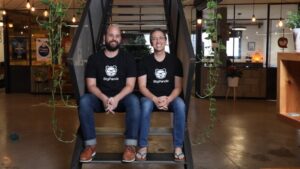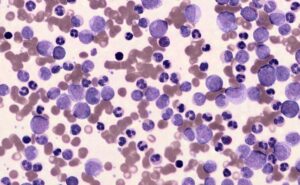Following a brain tumor operation in 2018, Prakash Rithe (name changed) suffered a stroke that rendered the left side of his body paralysed. While rehabilitation exercises helped restore mobility and functioning, his elbow continued to be unresponsive. Prakash was then introduced to a robotic rehabilitation device developed by Rymo Technologies Private Limited (Rymo), a Mumbai-based startup. In a few months, the improvement was palpable. “My elbow started functioning, resulting in the arm regaining strength and the wrist and fingers becoming increasingly relaxed,” says a middle-aged Prakash whose self-esteem grew along with physical independence.
Product-market fit
The reputation of RYMO – the acronym for Rediscover Your Mobility – rests on such success stories. The smart, compact, modular, portable machine it has built addresses the twin objectives of improved accessibility and affordability of advanced rehabilitation technology for neurological/ orthopaedic patients. Called Mobi-L, the multipurpose solution offers 20-plus exercises for upper and lower limbs through multiple attachments, each serving a particular part of the limbs. The various in-built training modes, aimed at improving range of motion, muscle strength and cognition ability, can be calibrated as per the patient’s requirement. An integrated software gives an objective assessment of progress from day 1 even as it gamifies the workout regimen to ward off boredom.
Prototype of Mobi-L, a multipurpose solution that offers 20-plus exercises for upper and lower limbs through multiple attachments. (Design changes to occur during industrial design)
The product is already in use at multiple rehabilitation clinics. Dr Fleur Barretto, a physiotherapist in the Rehab Team of India, a rehabilitation clinic in Mumbai, finds Mobi-L particularly effective in keeping patients engaged through simulated Activities of Daily Living (ADL) and games in a goal-oriented approach. “The patients wait for their turn at the machine since it’s a welcome change from the dullness of repetitive task-specific exercises,” says Dr Fleur. Since the machine prioritises mobility training and ADL activities, it becomes easier for the physiotherapist to help a patient return to a normal life, she adds.
According to Dr Yogita Nagpal, a physiotherapist at Pune’s GB School of Neuro Rehabilitation, Mobi-L stands out on three counts – the patient’s comfort in using the device, the attachments that make it easy to shift the patient from hand exercises to leg exercises in just a few minutes, and the ease with which the degree of resistance can be arranged to boost the muscle’s capabilities.
Founders of RYMO – Chirag Shah (right) and Abhishek Rai (left)
It’s a significant leg-up over most products in the market, which are bulky, expensive, space-consuming and dedicated to specific limbs and joints. “Simply put, our cost-effective equipment provides the benefits of multiple robotic devices in a much smaller footprint,” says Chirag Shah, an electronics-telecommunication engineer and one of the two co-founders of Rymo, where he is the CEO. Abhishek Rai, the other founder-cum-CTO, is a mechanical engineer. Their friendship was forged at the robotics club in KJ Somaiya College of Engineering in Mumbai. However, it was a visit to a physiotherapy centre in the adjoining campus that gave the young men a fresh purpose in life: Build a robotic device to accelerate rehabilitation. Since 2018, the founders have been working at the Research Innovation Incubation Design Labs (RiiDL) in Somaiya Vidyavihar, Mumbai, and negotiated several course-corrections, finally landing up with a product that has witnessed multiple stages of designing, prototyping and testing based on the feedback from 200+ physiotherapists and patients across the country.
Opportunities galore
If one goes by the sheer numbers, the assistive robotic therapy landscape in India offers lucrative opportunities for Mobi-L. Every year 20 million Indians undergo rehabilitation due to stroke, accidents, injuries, osteoporosis, arthritis, joint replacement surgeries etc. They need to be objectively assessed for physical parameters like the range of motion, strength, speed of movement, while undergoing goal-based training. This population is disproportionately served by a limited number of therapists –1/30000 patients. There is also a high drop-out rate among patients. All these factors leave Mobi-L with a vast playing field. The startup has a significant edge over competitors dealing in products that are not affordable and customized to the needs of local rehabilitation centres.
Sensing a need in the sector, it was but natural for the founders to approach Social Alpha, a multistage innovation curation and venture development platform for science and technology start-ups that aim to address the most critical social, economic, and environmental challenges.
Role of Social Alpha, SIDBI, and the UK Government
It was the alignment of Rymo’s core values, Social Alpha’s sectoral expertise along with SIDBI, and the UK government’s vision that brought together multiple resources to launch Mobi-L in the market. The passion and technical know-how of the Rymo team too played a big role in catalysing the process.
Small Industries Development Bank of India (SIDBI), the UK Government and Social Alpha have committed to support the startup through a blended financing model, Swavalamban Divyangjan Assistive Technology Market Access (ATMA) fund. “SIDBI is always committed to serve the underserved through its initiatives. Hence, a focused fund to address the problems of the differently-abled, where the benefit is transferred directly to that population. Rymo will add value to the endeavour by addressing the underserved segment of the society and enabling their mainstreaming,” said Chandra Shekhar Thanvi, CGM SIDBI.
The SIDBI ATMA grant will be immensely helpful for Rymo. “It allows us to reach out to many more physiotherapists with our solution early on in our journey and gives us a chance to further improve our product with their feedback and provide them with upgrades. The grant will also help us make robotic rehabilitation technology accessible and affordable to under-served communities by financing a part of the selling price, thereby reducing the out-of-pocket expenditure for DAPs,” says Chirag.
Social Alpha’s Assistive Technology wing is committed to improve the availability, accessibility and affordability of innovative assistive technology solutions to drive inclusion and enable a better quality of life for millions of Differently Abled Persons (DAPs) in India. “Through our sectoral research and experience of working with more than 450 startups, we have come to realise that physical rehabilitation helps DAPs to be independent in their personal and professional life by aiding recovery,” says Pragyan Sagarika Pani, Portfolio Manager for Rymo. Access to rehabilitation and recovery will ultimately enable them to pay for advanced assistive technologies, she adds.



![Read more about the article [Investor Summit 2021] Decoding what investors want](https://blog.digitalsevaa.com/wp-content/uploads/2021/04/Imagesett-1617256064488-300x150.jpg)






